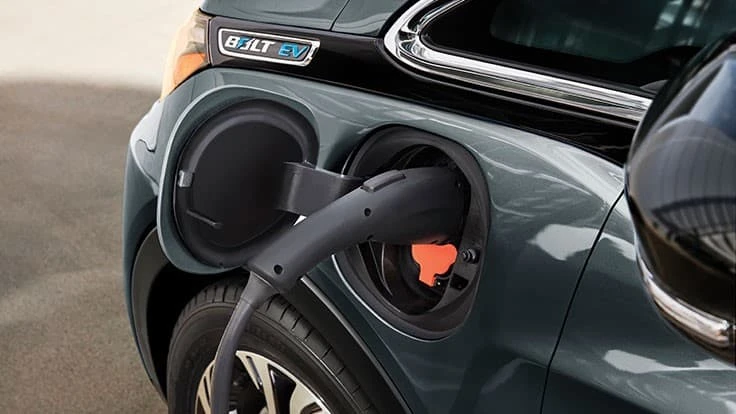
Photo courtesy of General Motors
GM says it plans to become carbon neutral in its global products and operations by 2040, and increased electric vehicle production will factor into meeting that goal, as will helping to establish charging stations powered by renewable energy.
The company says it has worked with the Environmental Defense Fund (EDF) to develop “a shared vision of an all-electric future and an aspiration to eliminate tailpipe emissions from new light-duty vehicles by 2035.” GM says it will offer zero-emissions vehicles across a range of price points, working with its stakeholders and the EDF to build the necessary charging infrastructure.
“With this extraordinary step forward, GM is making it crystal clear that taking action to eliminate pollution from all new light-duty vehicles by 2035 is an essential element of any automaker’s business plan," EDF President Fred Krupp says. "EDF and GM have had some important differences in the past, but this is a new day in America—one where serious collaboration to achieve transportation electrification, science-based climate progress and equitably shared economic opportunity can move our nation forward.”
GM says it plans to decarbonize its portfolio by transitioning to battery electric vehicles or other zero-emissions vehicle technology, sourcing renewable energy and leveraging minimal offsets or credits.
The use of its products accounts for 75 percent of carbon emissions related to this commitment, according to GM. Therefore, the company says it will offer 30 all-electric models globally by mid-decade, and 40 percent of the company’s U.S. models offered will be battery electric vehicles by the end of 2025. GM says it is investing $27 billion in electric and autonomous vehicles in the next five years, $7 billion more than it had planned before the onset of the COVID-19 pandemic.
GM says this investment includes the continued development of GM’s Ultium battery technology, updating facilities such as Factory ZERO in Michigan and Spring Hill Manufacturing in Tennessee to build electric vehicles from globally sourced parts and investing in new sites such as Ultium Cells LLC in Ohio as well as in manufacturing and STEM jobs.
More than half of GM’s capital spending and product development team will be devoted to electric and electric-autonomous vehicle programs, according to the company, which adds that it will continue to increase the fuel efficiency of its traditional internal combustion vehicles in accordance with regional fuel economy and greenhouse gas regulations. Some of these initiatives include fuel economy improvement technologies, such as Stop/Start, aerodynamic efficiency enhancements, downsized boosted engines, more efficient transmissions and other vehicle improvements, including mass reduction and lower rolling resistance tires.
GM says it also plans to source 100 percent renewable energy to power its U.S. sites by 2030 and for its global sites by 2035, which represents a five-year acceleration of the company’s previously announced global goal.
The company says it has worked with some of its largest suppliers to create a sustainability council to share best practices, learn from each other and create new standards for the industry. In addition to the council’s work, GM is collaborating with suppliers to set ambitious targets for the supply chain to reduce emissions, increase transparency and source more sustainable materials.
GM also acknowledges that while electric vehicles do not emit tailpipe emissions, they must be charged with electricity generated from renewable sources to be truly beneficial from a carbon-reduction standpoint. Therefore, the company says it has worked with utilities and developers to support investments in renewable energy found in and around communities that have GM facilities via power purchase agreements and green tariffs. GM says it also working with EVgo to triple the size of the nation’s largest public fast-charging network by adding more than 2,700 new fast chargers by the end of 2025, helping to accelerate widespread electric vehicle adoption. The new fast chargers will be powered by 100 percent renewable energy.
Latest from Recycling Today
- BMW Group, Encory launch 'direct recycling’ of batteries
- Loom Carbon, RTI International partner to scale textile recycling technology
- Goodwill Industries of West Michigan, American Glass Mosaics partner to divert glass from landfill
- CARI forms federal advocacy partnership
- Monthly packaging papers shipments down in November
- STEEL Act aims to enhance trade enforcement to prevent dumping of steel in the US
- San Francisco schools introduce compostable lunch trays
- Aduro graduates from Shell GameChanger program





